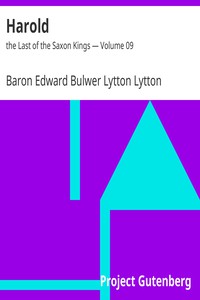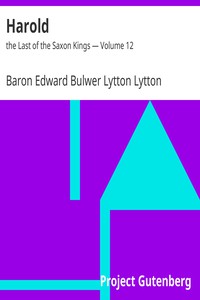Harold : the Last of the Saxon Kings — Complete, Lytton [best e reader for academics .txt] 📗

- Author: Lytton
Book online «Harold : the Last of the Saxon Kings — Complete, Lytton [best e reader for academics .txt] 📗». Author Lytton
Thus embruted and degraded, deriving little from religion itself, except its terrors, the general habits of the peasants on the continent of France were against the very basis of Christianity—marriage. They lived together for the most part without that tie, and hence the common name, with which they were called by their masters, lay and clerical, was the coarsest word contempt can apply to the sons of women.
“The hounds glare at us,” said Odo, as a drove of these miserable serfs passed along. “They need ever the lash to teach them to know the master. Are they thus mutinous and surly in England, Lord Harold?”
“No: but there our meanest theowes are not seen so clad, nor housed in such hovels,” said the Earl.
“And is it really true that a villein with you can rise to be a noble?”
“Of at least yearly occurrence. Perhaps the forefathers of one-fourth of our Anglo-Saxon thegns held the plough, or followed some craft mechanical.”
Duke William politicly checked Odo’s answer, and said mildly:
“Every land its own laws: and by them alone should it be governed by a virtuous and wise ruler. But, noble Harold, I grieve that you should thus note the sore point in my realm. I grant that the condition of the peasants and the culture of the land need reform. But in my childhood, there was a fierce outbreak of rebellion among the villeins, needing bloody example to check, and the memories of wrath between lord and villein must sleep before we can do justice between them, as please St. Peter, and by Lanfranc’s aid, we hope to do. Meanwhile, one great portion of our villeinage in our larger towns we have much mitigated. For trade and commerce are the strength of rising states; and if our fields are barren our streets are prosperous.”
Harold bowed, and rode musingly on. That civilisation he had so much admired bounded itself to the noble class, and, at farthest, to the circle of the Duke’s commercial policy. Beyond it, on the outskirts of humanity, lay the mass of the people. And here, no comparison in favour of the latter could be found between English and Norman civilisation.
The towers of Bayeux rose dim in the distance, when William proposed a halt in a pleasant spot by the side of a small stream, overshadowed by oak and beech. A tent for himself and Harold was pitched in haste, and after an abstemious refreshment, the Duke, taking Harold’s arm, led him away from the train along the margin of the murmuring stream.
They were soon in a remote, pastoral, primitive spot, a spot like those which the old menestrels loved to describe, and in which some pious hermit might, pleased, have fixed his solitary home.
Halting where a mossy bank jutted over the water, William motioned to his companion to seat himself, and reclining at his side, abstractedly took the pebbles from the margin and dropped them into the stream. They fell to the botton with a hollow sound; the circle they made on the surface widened, and was lost; and the wave rushed and murmured on, disdainful.
“Harold,” said the Duke at last, “thou hast thought, I fear, that I have trifled with thy impatience to return. But there is on my mind a matter of great moment to thee and to me, and it must out, before thou canst depart. On this very spot where we now sit, sate in early youth, Edward thy King, and William thy host. Soothed by the loneliness of the place, and the music of the bell from the church tower, rising pale through yonder glade, Edward spoke of his desire for the monastic life, and of his content with his exile in the Norman land. Few then were the hopes that he should ever attain the throne of Alfred. I, more martial, and ardent for him as myself, combated the thought of the convent, and promised, that, if ever occasion meet arrived, and he needed the Norman help, I would, with arm and heart, do a chief’s best to win him his lawful crown. Heedest thou me, dear Harold?”
“Ay, my host, with heart as with ear.”
“And Edward then, pressing my hand as I now press thine, while answering gratefully, promised, that if he did, contrary to all human foresight, gain his heritage, he, in case I survived him, would bequeath that heritage to me. Thy hand withdraws itself from mine.”
“But from surprise: Duke William, proceed.”
“Now,” resumed William, “when thy kinsmen were sent to me as hostages for the most powerful House in England—the only one that could thwart the desire of my cousin—I naturally deemed this a corroboration of his promise, and an earnest of his continued designs; and in this I was reassured by the prelate, Robert, Archbishop of Canterbury, who knew the most secret conscience of your King. Wherefore my pertinacity in retaining those hostages; wherefore my disregard to Edward’s mere remonstrances, which I not unnaturally conceived to be but his meek confessions to the urgent demands of thyself and House. Since then, Fortune or Providence hath favoured the promise of the King, and my just expectations founded thereon. For one moment, it seemed indeed, that Edward regretted or reconsidered the pledge of our youth. He sent for his kinsman, the Atheling, natural heir to the throne. But the poor prince died. The son, a mere child, if I am rightly informed, the laws of thy land will set aside, should Edward die ere the child grown a man; and, moreover, I am assured, that the young Edgar hath no power of mind or intellect to wield so weighty a sceptre as that of England. Your King, also, even since your absence, hath had severe visitings of sickness, and ere another year his new Abbey may hold his tomb.”
William here paused; again





Comments (0)